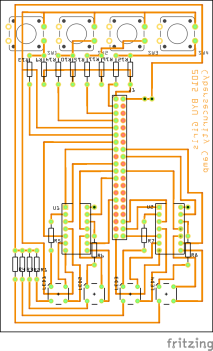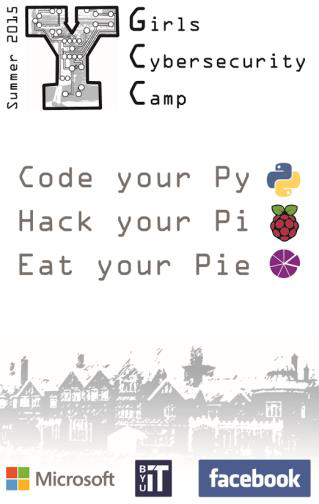Sarah Cunha and Dale Rowe, Information Technology
In 2015, the BYU Cybersecurity Research Lab (CSRL) held its first annual summer camp for Girls aged 14-18. A total of 38 girls attended the week’s activities and workshops. While over 75% of girls indicated they had taken a computing-related class, only 40% reported any significant interest in cybersecurity prior to the summercamp with 10% believing they had some experience in the field. At the conclusion of the camp, 80% of attendees reported a significant interest in the field with 100% of attendees interested in attending a similar event again.
The 2015 summercamp consisted of various workshops, keynotes, and activities related to cybersecurity. The activities and workshops were created, designed, and taught by undergraduate and graduate students in the CSRL, assisted by Dr. Rowe and Trevor O’Donnal, BYU’s Security Analyst. The topics taught varied from basic programming to networking to social engineering. Each day focused on one aspect of cybersecurity to give the girls a high-level understanding of the diversity in study within cybersecurity.
Sponsoring for the camp was provided by BYU ORCA, as well as Microsoft and Facebook, two companies contacted and recruited by the CSRL. This funding allowed for food to be provided by BYU catering each day, t-shirts with the camp design (see Figure 1), and for specific resources to be bought, made, and given to each girl attending. Each girl received a mini-computer, known as a Raspberry Pi, and a kit to go with it that provided connector dongles, a breadboard, different values of resistors, buttons, and connectors that the girls were instructed how to implement and use in order to write their own code that can affect the real world, or in this case, their physical bread boards. The advertising for the camp was done through contacts at each local school, as well as social media sharing and posters made by the student committee.
The camp’s design and purpose was to both to increase awareness of the study of cybersecurity and to enable young women in their understanding and confidence in a male-dominated field. Both from the survey answers referenced above and individual interaction with the students, many seemed to have grown in confidence regarding cybersecurity and their abilities in STEM fields in general. Although not all expressed interest in the cybersecurity field as a field of future study, many of them were very interested, and all of the participants expressed a desire to be a part of the camp again if able.
Each day of the camp was kicked-off by a keynote speaker, preferably a woman, from each of the camp sponsors (Microsoft and Facebook) as well as BYU OIT and LDS Tech. These keynote presentations focused on women in a cybersecurity career, how they got there, and what their role is like in their company. These keynotes were paramount in showing the girls what a career in cybersecurity can be like, as well as great networking opportunities for the girls with high profile people in the industry.
A major workshop this year conducted by Dr. Rowe taught the participants the concepts of password cracking via a customized circuit board. The circuit board was designed by Dr. Rowe (Figure 2), cut by the BYU Electronics and Computer Engineering shop, and soldered and tested by the mentoring students and faculty. The board allowed the participants to input brute-force attempts manually on a 16-bit password. This method would take the students about 2-5 minutes to crack the password. Afterwards Dr. Rowe sent the circuit board through an automatic password cracker (code given to the students) which was able to do the same task in seconds. This showed the girls the power of automatic password cracking, and how important it is to have a password that is secure and difficult to crack.
The camp overall was a great success. Plans are being made in the CSRL to continue the camp annually with even more funding from sponsors. The camp will hopefully also grow to have a greater capacity for participants by recruiting local instructors to help in the teaching and mentoring.
Figure 1 – The poster used during the camp. The same design was used for T-shirts and custom desktop art on each girl’s Raspberry Pi.

Figure 2 – The PCB design of the circuit boards made for each girl to teach password cracking and brute forcing.

